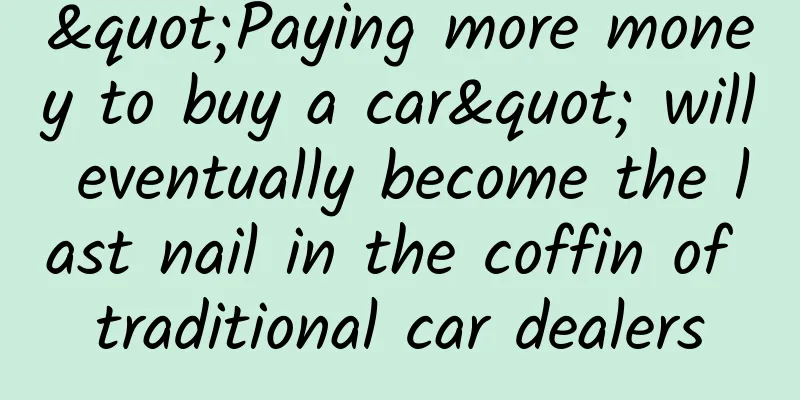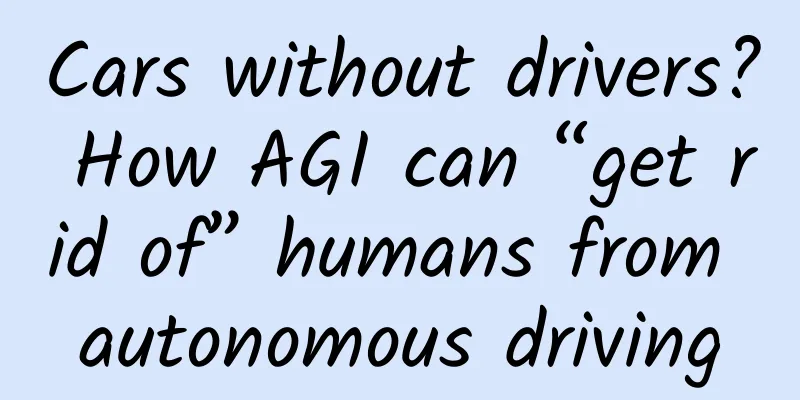"Paying more money to buy a car" will eventually become the last nail in the coffin of traditional car dealers

|
I believe that anyone who has bought a hot-selling car model at a domestic 4S store has encountered this kind of thing - most of the time you will be told that the car is out of stock and you need to wait for several months to get it. But if you add a few thousand or tens of thousands of yuan, you can shorten the waiting time. If you add enough money, you can even drive away on the same day. This is the legendary price increase to get the car. The practice of "paying more to get a car" has existed in the car market for a long time. However, after nearly 20 years, this phenomenon has evolved in order to evade regulation. After the new regulations in 2017 banned "paying more to get a car", "paying more to get a car" has gone from being an open transaction to an "unspoken rule". Even if no one says it out loud, as long as the salesperson tells you that there is no car in stock, everyone will know what the other party wants to do. For many years, facing such unspoken rules of dealers, consumers can be said to be miserable, but there is no way to deal with it. Even if it is now stipulated that you cannot increase the price to pick up the car, there are still various pitfalls such as financial service fees waiting for you, or turning "adding money to pick up the car" into expensive "interior decoration". Anyway, 4S stores always have a way to increase the price in a roundabout way when you buy a car. Behind the long-term price increase is the pursuit of 4S stores for maximizing profits. The operation of 4S stores requires a lot of capital costs. Because 4S stores include sales, parts supply, after-sales and information feedback, they need a relatively large store and a large number of employees. The investment in opening a 4S store is at least more than 30 million, and the maintenance cost is even higher. According to conservative estimates, a 4S store of a mid- to low-end brand needs to sell about 1,500 cars a year to avoid losses. In the profit structure of the entire industry chain, the profit from car sales is the lowest, and the largest profit is generated from the service link after the purchase of the car, such as insurance, maintenance, repair and other expenses. However, in the after-sales stage, customers may not necessarily return to 4S stores for consumption. Therefore, targeting those customers who are eager for new cars has become the most convenient option for dealers. The ambiguous attitude of the OEMs towards price increases has also contributed to the formation of unspoken rules, intentionally or unintentionally. After all, dealers are able to increase prices because there is an imbalance between supply and demand for products, and the OEMs are to blame for this. Whenever a new product is launched, the OEM needs to increase customer demand for the product, whether it is due to insufficient production capacity or hunger marketing. As a common interest with dealers, the OEM may verbally prohibit price increases, but in the face of interests, all announcements are false. Even if the OEM wants to control prices, they are legally in a passive position compared to dealers. The Anti-Monopoly Law stipulates that manufacturers cannot control prices, and 4S stores do not need to sell cars according to the recommended price. The price increase during sales is a market behavior. On the contrary, if manufacturers want to control the prices of dealers, they will end up like Toyota Motor (China), which was fined RMB 87.613 million for "unifying the dealer network's quotations and limiting the minimum price at which dealers can resell goods." The OEMs cannot control the dealers' pricing. Dealers hide behind market behavior, and 4S stores engage in bundled sales during sales. All these pursuits of profits ultimately harm the reputation of the automotive industry as a whole. In 2019, a video of a female Mercedes-Benz owner in Xi'an sitting on the hood of her car and crying for her rights went viral. It not only brought out the car owners' long-standing dissatisfaction with the 4S stores' unspoken rules of bundled sales, but also pushed the disputes between the car owners and the 4S stores to the forefront of media attention, making the shady dealings of the 4S stores known to everyone. If the negative media attention was a blow to 4S stores, then the cooling of the entire auto industry behind it was a fatal blow. At the beginning of this year, the All-China Federation of Industry and Commerce Automobile Dealers Association and more than 60 dealers issued a "Proposal to Passenger Car Companies", which disclosed that 53.5% of dealers around the world suffered losses in 2018, and this proportion rose to 71% in 2019. The total number of automobile dealers has declined by 14.8%, and 4S stores in third- and fourth-tier cities are facing a wave of store closures. In the "2019 National Automobile Dealer Survival Status Survey Report" released by the China Automobile Dealers Association, it was mentioned that more than 70% of dealers failed to achieve their annual targets in 2019, and sales price inversion was common, with 79.9% of dealers experiencing price inversion. In addition, dealers' profits are also declining. Among the dealers that made profits in 2019, only 10% saw a net increase in profits, while 15% of dealers made less profit than the same period last year, and the average gross profit margin was even negative. In 2020, with the outbreak of the epidemic, dealers in the automotive industry will face a more difficult market. To make matters worse, traditional dealers have to face a new and powerful rival - the direct sales model. The emergence of the direct sales model has brought a new perspective to car sales. Consumers order cars online, and then receive delivery and after-sales service at offline direct stores. The entire model integrates test drives, car orders, delivery and after-sales service. Online orders have very transparent prices, and after giving up channel costs, they can also offer an affordable price. Compared with 4S stores and traditional dealers, there is no sales staff involved, which eliminates consumers' distrust of sales staff and improves efficiency. For OEMs, the direct sales model allows them to unify prices and increase profits without having to worry about the chaos in 4S stores affecting the brand's reputation. However, this does not mean that traditional dealers have no advantages. Although the direct sales model has advantages in terms of service level, it has fatal shortcomings in terms of expansion and penetration into third- and fourth-tier cities due to the high cost of opening stores. An industry insider once bluntly pointed out in an interview that the direct sales model "cannot achieve sales" because "China is too big to cover all regions." Moreover, for traditional large manufacturers, it is impossible to easily break up the dealer system and completely change their sales strategy when the dealer system is already perfect. In addition, 4S stores also play the role of a capital pool. Picking up a car in the store requires paying the full amount to the OEM in advance. With the expansion of the dealer network, the OEM will have a very large amount of liquidity. Therefore, in the foreseeable future, we will see that traditional OEMs will still use the dealer model, while emerging companies that come from behind will choose the direct sales model that can shape the brand image more quickly. We don’t know whether a new hybrid model can be produced in this development, but the only thing that is certain is that traditional dealers are burdened with the heavy burden of "4S stores". To be precise, under the direct sales model, customers are used to transparent prices, which is a fatal blow to 4S stores. Customers who buy cars according to the manufacturer's suggested price will find it difficult to accept the unspoken rule of "paying extra to pick up the car", which ultimately leads to the disappearance of 4S stores. This has happened in China before. The emergence of Taobao and JD.com directly led to the demise of the popular Zhongguancun hardware market. Similarly, "paying a premium to buy a car" will eventually become the final nail in the coffin of traditional car dealers. As a winner of Toutiao's Qingyun Plan and Baijiahao's Bai+ Plan, the 2019 Baidu Digital Author of the Year, the Baijiahao's Most Popular Author in the Technology Field, the 2019 Sogou Technology and Culture Author, and the 2021 Baijiahao Quarterly Influential Creator, he has won many awards, including the 2013 Sohu Best Industry Media Person, the 2015 China New Media Entrepreneurship Competition Beijing Third Place, the 2015 Guangmang Experience Award, the 2015 China New Media Entrepreneurship Competition Finals Third Place, and the 2018 Baidu Dynamic Annual Powerful Celebrity. |
>>: Samsung almost sold you the Note7 that was saved from the explosion. Will it be the next HTC?
Recommend
Will eating noodles lead to malnutrition? 8 points to know
The summer solstice is here. In this sweaty midsu...
How to increase the click-through rate of game information flow ads?
How come game advertising is in such a mess? 01 O...
How does online education build a private traffic system?
Traffic costs are becoming more and more expensiv...
Has Apple's design philosophy really gone astray by sacrificing practicality for simplicity?
Once upon a time, Apple was known for its product...
User Operation: How to create a To B user portrait?
Why do we need to create user portraits? How to c...
What kind of data analysis should be done from the start-up to the maturity of APP?
DAU, MAU, retention rate , frequency, duration......
How to plan a “national topic” to trigger user growth?
Since yesterday, many people’s Moments have been ...
Jiguang launches IM product "Let App Chat"
Recently, Jiguang Push, the largest push service ...
The monetization model of community operation!
We have mentioned before that the monetization me...
1,300 years from now, Legos might still be popping up on this beach…
For beachcombers , Cornwall, in the southwest cor...
The effect of Cordyceps sinensis on lung cancer. Is Cordyceps sinensis effective against lung cancer?
Due to today's environmental problems and the...
A brief discussion on the relationship between iOS, Android, Unix and Linux
First, let's look at the time when several sy...
Have you ever seen a pterosaur taller than a giraffe?
In the Mesozoic exhibition hall of the Houston Mu...
An extremely rare total solar eclipse will take place in 2024. Sun chasers, hurry up and collect your guide!
8 tips for traveling during the 2024 total solar ...
Why do flies always like to "rub their hands"? They even twist their heads off to play with them? I was shocked after reading the truth...
Expert: Zhang Qikai, Chinese Academy of Agricultu...









